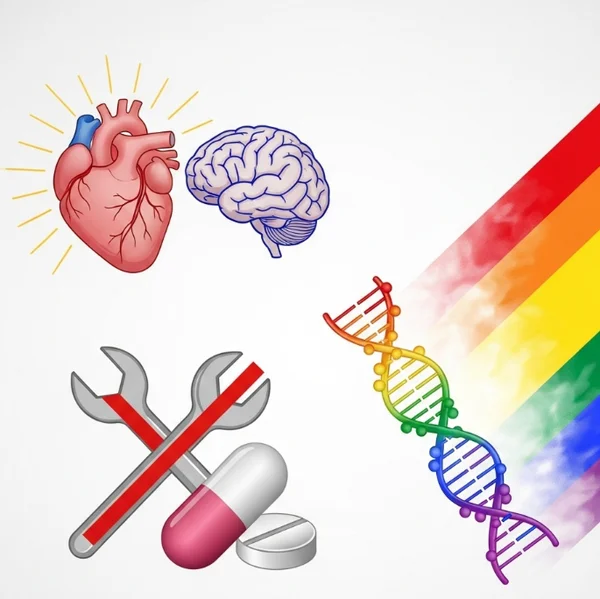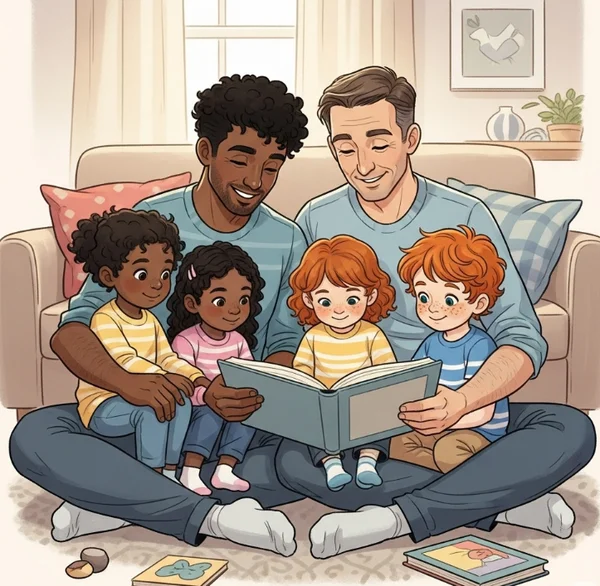Debunking Gay Myths: Facts About Gay Identity & Stereotypes
June 22, 2025 | By Isla Dawson
Separating Fact from Fiction: Common Misconceptions About Gay Men
Society often holds onto outdated and inaccurate ideas about different groups of people, and individuals with a gay identity are no exception. Persistent gay stereotypes and gay myths not only spread misinformation but can also cause significant harm and contribute to prejudice. What are common gay stereotypes? This article is dedicated to debunking myths and presenting homosexuality facts to foster better understanding of gay men and promote a more informed and respectful society. If you're exploring your own identity or seeking to understand others, separating fact from fiction is crucial, and resources like the gay quiz at GayQuiz.org encourage thoughtful self-reflection away from societal biases.
Myth #1: You Can "Spot" a Gay Man by His Appearance or Mannerisms
One of the most pervasive gay stereotypes is the idea that you can identify a gay man based on his appearance, how he dresses, speaks, or his mannerisms. Are all gay men feminine? This is a common, yet baseless, assumption.
The Truth: Diversity in Expression Among Gay Men
The reality is that gay men exhibit incredible diversity in their self-expression, just like heterosexual men. Some gay men may align with traditionally masculine presentations, others with more feminine ones, and many fall somewhere in between or defy these categories altogether. There are no specific "gay characteristics" that universally apply.

Why Stereotypes About "Gay Characteristics" Are Harmful
These harmful stereotypes limit individuals, create unfair expectations, and can fuel prejudice and discrimination. When we reduce people to caricatures based on perceived "gay characteristics," we fail to see them as the unique individuals they are. This directly impacts the understanding of gay men as complex human beings.
Myth #2: Gay Men Are Only Interested in Sex / Are More Promiscuous
Another damaging gay myth revolves around relationships and sexuality, often portraying gay men as solely interested in sex or as being inherently more promiscuous than their heterosexual counterparts.
The Truth: Gay Men Seek Love, Commitment, and Varied Relationships
Homosexuality facts show that gay men, like all people, seek a wide range of connections, including deep emotional connection, love, commitment, and fulfilling relationships. Some may prefer casual encounters, others long-term partnerships, and many desire both at different points in their lives – a diversity of desires mirrored in the heterosexual population.

How This Myth Contributes to Stigma in Understanding Gay Men
This particular myth contributes significantly to the stigma surrounding gay men and their relationships. It can devalue their emotional bonds and lead to a skewed understanding of gay men, reducing their complex emotional lives to a single dimension. It's important to recognize that a desire for sex does not negate the capacity for deep, loving relationships.
Myth #3: Homosexuality is a "Choice" or Can Be "Cured"
A deeply entrenched and harmful gay myth is the assertion that having a gay identity is a choice, or that one's sexual orientation can be changed or "cured," often through so-called "conversion therapy." Is being gay a choice?
The Truth: Scientific Consensus on Sexual Orientation
The overwhelming scientific consensus from major medical and psychological organizations worldwide is that homosexuality is a normal variation of human sexuality and is not a choice. While the exact interplay of biological factors, psychological factors, and environmental influences is still researched, it is not something one simply decides. These homosexuality facts are well-established.
The Dangers and Ineffectiveness of "Conversion Therapy"
So-called "conversion therapy" (practices aimed at changing an individual's sexual orientation) has been widely discredited and condemned by all major medical and mental health organizations as ineffective and harmful. Such practices pose significant dangers to mental health, leading to depression, anxiety, self-hatred, and even suicide. Believing homosexuality can be "cured" is a dangerous falsehood.

Myth #4: Gay Men Don't Want/Can't Have Families or Children
The gay stereotype that gay men are not interested in or are incapable of forming families or raising children is another common misconception that needs debunking.
The Truth: Diverse Family Structures in the LGBTQ+ Community
Many gay men desire and create loving families with children, whether through adoption, surrogacy, co-parenting, or other means. LGBTQ facts show a growing number of diverse families headed by same-sex couples, reflecting the universal human desire for family and parenting.

Research on Children Raised by Same-Sex Parents
Decades of research consistently show that children raised by gay parents (or lesbian parents) fare just as well as those raised by heterosexual parents in terms of psychological adjustment, social development, and educational outcomes. The quality of parenting and the resources available to the family are what matter, not the parents' sexual orientation.
Myth #5: All Gay Men Fit a Certain "Lifestyle" or Have Specific Interests
The notion that all gay men share a singular "gay lifestyle" or a narrow set of interests (often based on media portrayals or limited exposure) is a simplistic and inaccurate gay stereotype.
The Truth: Individuality Transcends Sexual Orientation
Gay men are individuals with diverse personalities, hobbies, careers, and life experiences. Their sexual orientation is just one aspect of their gay identity. Assuming a monolithic "lifestyle" erases this rich individuality.
Understanding Gay Men as Individuals, Not a Monolith
True understanding of gay men comes from seeing them as individuals, each with their own unique story, preferences, and aspirations, rather than as a homogenous group or monolith defined solely by their sexuality. This is crucial for reducing prejudice.
Why Debunking Gay Myths Matters for Everyone
Debunking myths about gay identity and sexual orientation isn't just important for the LGBTQ+ community; it matters for everyone. Challenging common misconceptions and relying on homosexuality facts helps in reducing prejudice, fostering allyship, and creating an inclusive society where everyone feels safe, respected, and understood. The importance of facts cannot be overstated.
Challenging gay stereotypes and debunking gay myths is an ongoing process that requires commitment to education and empathy. By focusing on homosexuality facts and understanding gay men (and all LGBTQ+ individuals) as diverse human beings, we can move beyond harmful common misconceptions towards a more accepting world. If you're on a journey of understanding your own sexual orientation or that of others, remember that knowledge is power. Resources like those at GayQuiz.org aim to provide a space for reflection free from these societal biases. What are some other gay myths you think need debunking? Share your thoughts in the comments below.
Getting the Facts Straight About Gay Identity
-
Are gay stereotypes ever based on any truth?
Some gay stereotypes might stem from observations of some individuals within the gay community, but they become harmful when generalized to all gay people or used to limit understanding. No stereotype accurately captures the diversity of an entire group.
-
How can I respectfully correct someone spreading gay myths?
You can try sharing factual information calmly, perhaps saying, "Actually, research shows..." or "Many people in the LGBTQ community experience things differently." Focus on education rather than confrontation. Being a good ally involves debunking myths when you can.
-
Is it okay to ask a gay person if a stereotype is true for them?
It depends heavily on your relationship and the context. Generally, avoid putting someone on the spot to represent their entire gay identity or community. It's better to educate yourself through reliable LGBTQ facts and resources like this article.
-
Where can I find reliable LGBTQ facts and information?
Reputable organizations like the Human Rights Campaign (HRC), GLAAD, The Trevor Project, and the American Psychological Association (APA) offer a wealth of accurate homosexuality facts and information about sexual orientation.
-
Can taking a "gay quiz" help understand gay identity better?
While a gay quiz from GayQuiz.org is a tool for personal reflection on your own feelings and attractions, it's not designed to "diagnose" others or confirm/deny gay stereotypes. Understanding gay identity broadly comes from education, listening to personal stories, and challenging misconceptions.